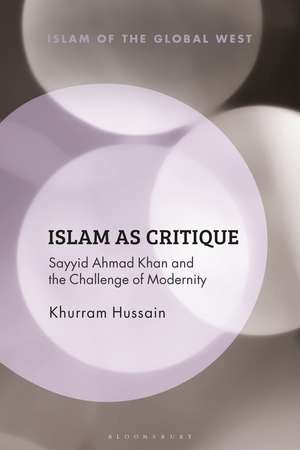Islam as Critique: Sayyid Ahmad Khan and the Challenge of Modernity: Islam of the Global West
Autor Khurram Hussainen Limba Engleză Paperback – 28 iul 2021
| Toate formatele și edițiile | Preț | Express |
|---|---|---|
| Paperback (1) | 217.27 lei 6-8 săpt. | |
| Bloomsbury Publishing – 28 iul 2021 | 217.27 lei 6-8 săpt. | |
| Hardback (1) | 495.19 lei 3-5 săpt. | +25.20 lei 10-14 zile |
| Bloomsbury Publishing – 4 sep 2019 | 495.19 lei 3-5 săpt. | +25.20 lei 10-14 zile |
Preț: 217.27 lei
Preț vechi: 274.68 lei
-21% Nou
Puncte Express: 326
Preț estimativ în valută:
41.59€ • 42.86$ • 35.11£
41.59€ • 42.86$ • 35.11£
Carte tipărită la comandă
Livrare economică 01-15 martie
Preluare comenzi: 021 569.72.76
Specificații
ISBN-13: 9781350248861
ISBN-10: 135024886X
Pagini: 232
Dimensiuni: 156 x 234 mm
Greutate: 0.33 kg
Editura: Bloomsbury Publishing
Colecția Bloomsbury Academic
Seria Islam of the Global West
Locul publicării:London, United Kingdom
ISBN-10: 135024886X
Pagini: 232
Dimensiuni: 156 x 234 mm
Greutate: 0.33 kg
Editura: Bloomsbury Publishing
Colecția Bloomsbury Academic
Seria Islam of the Global West
Locul publicării:London, United Kingdom
Caracteristici
Demonstrates how Islam can be read as critique, by bringing the Muslim thinker Khan into conversation with with similar critical analyses of the modern by Reinhold Niebuhr, Hannah Arendt, and Alasdair MacIntyre
Notă biografică
Khurram Hussain is Assistant Professor in the Department of Religion Studies at Lehigh University, USA.
Cuprins
Prologue Introduction 1. The Language of Reform 2. Modernism and Humanism 3. The Meaning and End of Time 4. The Viva Activa 5. Knowledge and Wisdom Epilogue: Can the Muslims Speak? Notes Bibliography Index
Recenzii
This provocative and thoughtful book will animate the interest of a range of scholars in Islamic Studies, South Asian Studies, Politics, Philosophy, and Postcolonial thought; it will also work as a great text to teach in courses on these and other topics.
Khurram Hussain's Islam as Critique: Sayyid Ahmad Khan and the Challenge of Modernity is an important and highly original book . The book's offerings are daring and original, and the style is engaging.
"This book is a welcome foray into uncharted territory. Hussain's ambition is to parallel and create a modern version of Sayyid Ahmad Khan's "mediated voice, the quintessentially Muslim voice, finding harmony in discord, and incorporating difference as an essential feature of a verdant, vigorous Islam". The message is at once compelling and productive, making this a volume of intense interest to multiple audiences, within and beyond the academy."
"In a world where ponderous and pretentious prose is an occupational hazard, Khurram Hussain is witty, even electric, writer, and a nimble and adventurous thinker. He is one of the few thinkers who could address both the absurdities and maddening realities of our long post-9/11 moment by treating the Islamic response to Western modernity not as an external but as an internal critique. Hussain shows that Sayyid Ahmad Khan, far from the figure of longstanding sympathetic and hostile caricatures, provides fertile resources for an Islamic, yet cosmopolitan, critique and reconstruction of modernity."
Khurram Hussain's Islam as Critique: Sayyid Ahmad Khan and the Challenge of Modernity is an important and highly original book . The book's offerings are daring and original, and the style is engaging.
"This book is a welcome foray into uncharted territory. Hussain's ambition is to parallel and create a modern version of Sayyid Ahmad Khan's "mediated voice, the quintessentially Muslim voice, finding harmony in discord, and incorporating difference as an essential feature of a verdant, vigorous Islam". The message is at once compelling and productive, making this a volume of intense interest to multiple audiences, within and beyond the academy."
"In a world where ponderous and pretentious prose is an occupational hazard, Khurram Hussain is witty, even electric, writer, and a nimble and adventurous thinker. He is one of the few thinkers who could address both the absurdities and maddening realities of our long post-9/11 moment by treating the Islamic response to Western modernity not as an external but as an internal critique. Hussain shows that Sayyid Ahmad Khan, far from the figure of longstanding sympathetic and hostile caricatures, provides fertile resources for an Islamic, yet cosmopolitan, critique and reconstruction of modernity."













